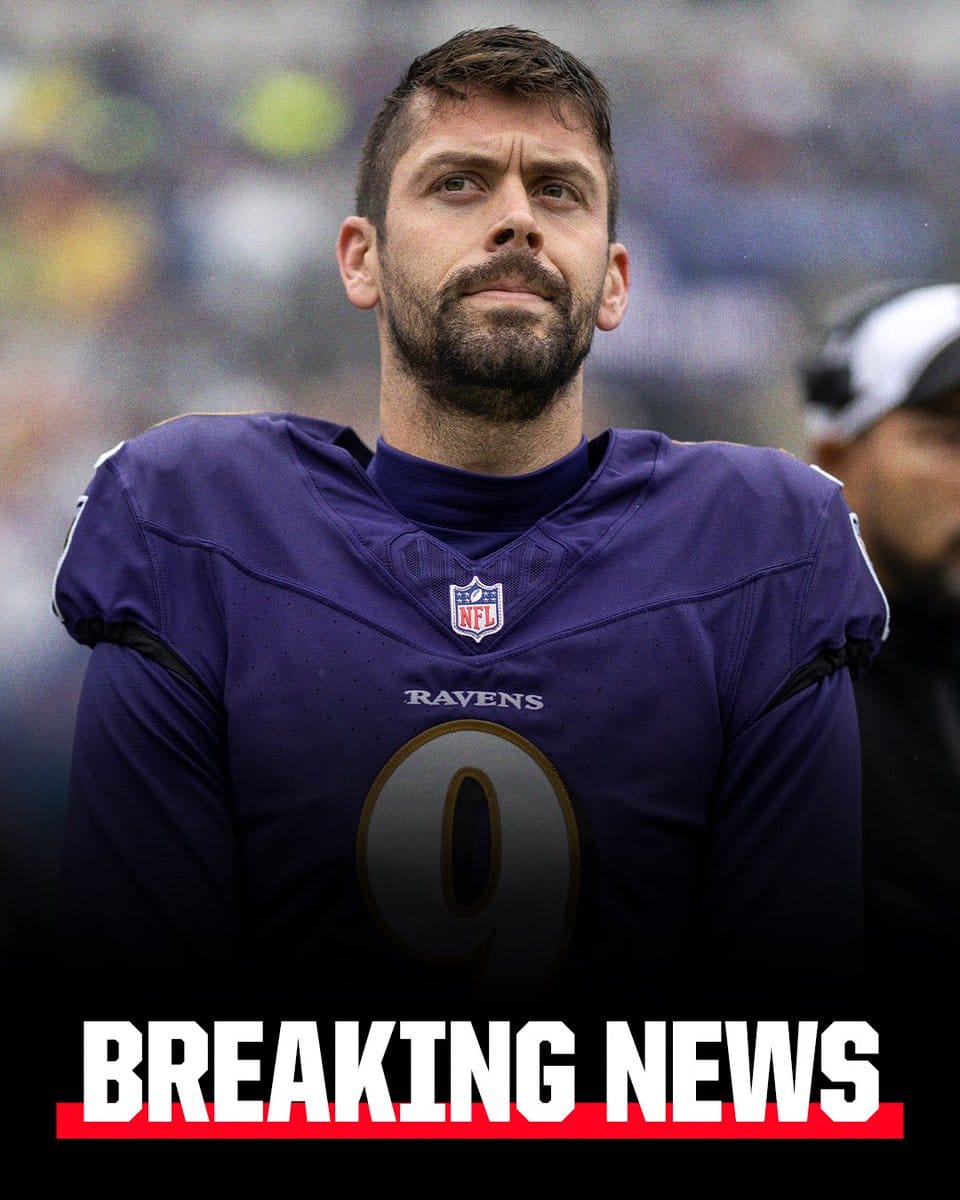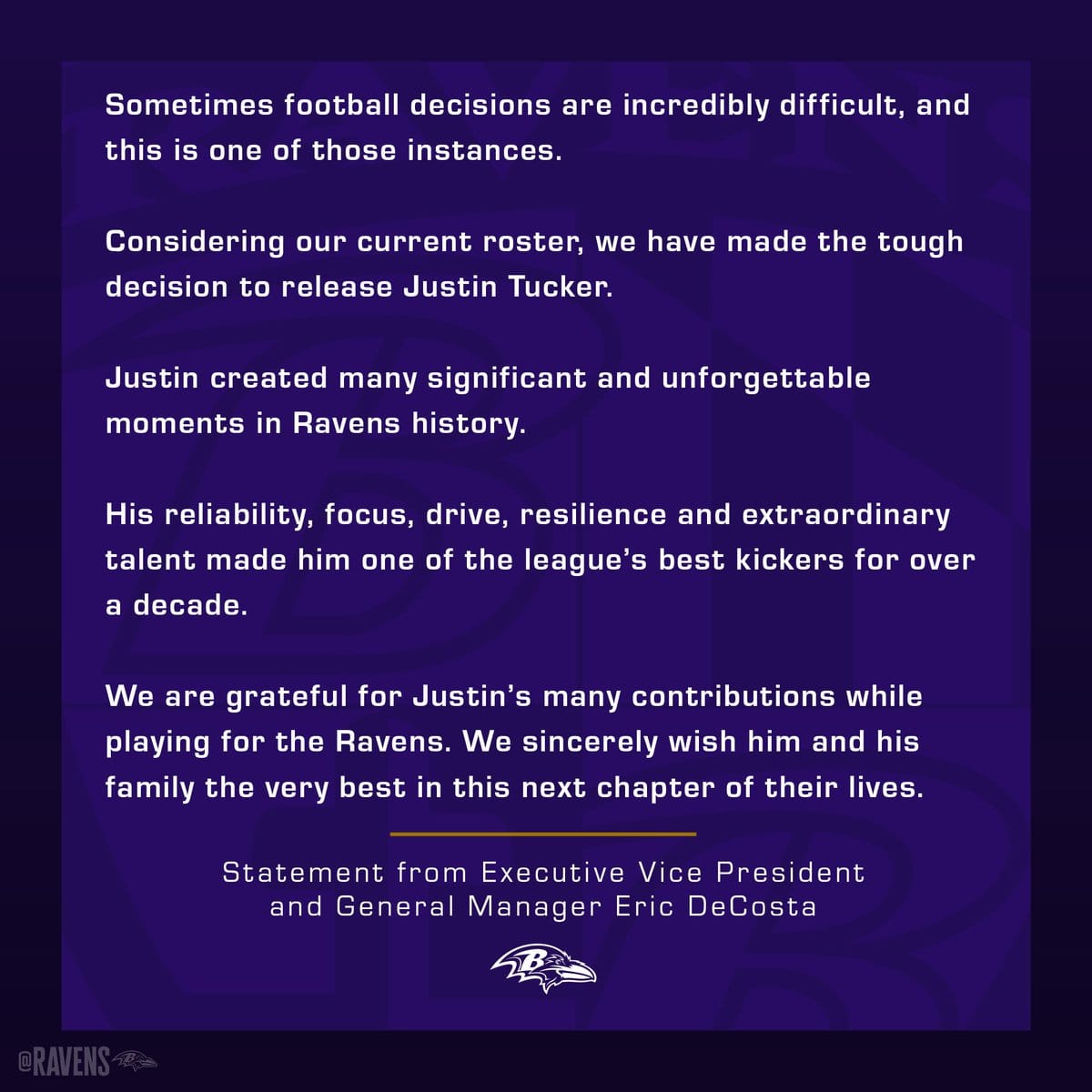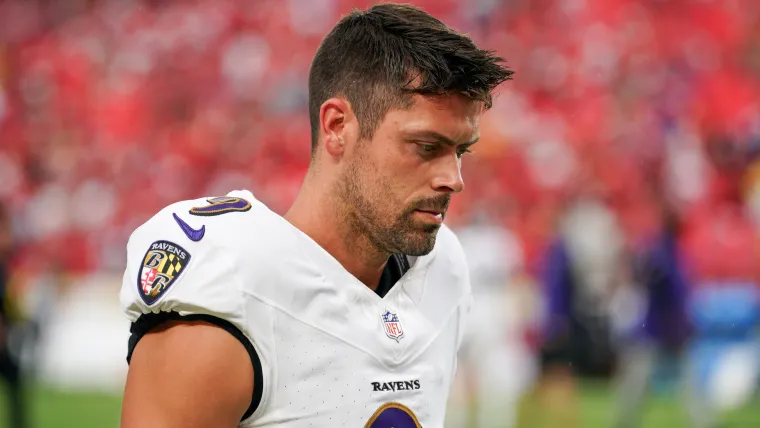
The Baltimore Ravens, one of the NFL’s most storied franchises, have made a seismic decision that has sent shockwaves through the football world: the release of Justin Tucker, widely regarded as the greatest kicker in NFL history. This move, announced on May 5, 2025, marks the end of an era for the Ravens and has sparked intense discussion among fans, analysts, and the broader sports community. While the team insists the decision was driven by football strategy, the timing—coming amid serious allegations of inappropriate behavior against Tucker—suggests a more complex narrative. As the Ravens transition to a new chapter with rookie kicker Tyler Loop, this article explores the factors behind Tucker’s release, the allegations, the team’s future, and the broader implications for the NFL.

The Legacy of Justin Tucker
Justin Tucker’s tenure with the Baltimore Ravens, which began in 2012 when he signed as an undrafted free agent out of the University of Texas, is nothing short of legendary. Over 13 seasons, Tucker redefined the role of an NFL kicker, combining pinpoint accuracy, remarkable range, and clutch performance under pressure. His career field goal percentage of 89.1% is the highest in NFL history among kickers with at least 100 attempts, and his 66-yard field goal against the Detroit Lions in 2021 remains the longest in league history. Tucker’s 1,775 career points rank 16th all-time, and his seven Pro Bowl selections and eight All-Pro honors underscore his dominance.
Beyond statistics, Tucker became a cultural icon in Baltimore. His appearances in commercials for brands like Royal Farms, Nike, and Dr Pepper made him one of the most recognizable figures in the city. His operatic singing voice, showcased in viral videos, added a layer of charisma to his public persona. For Ravens fans, Tucker was more than a kicker—he was a cornerstone of the franchise, the last remaining player from the 2012 Super Bowl-winning team, and a symbol of consistency in a league defined by turnover.
However, Tucker’s 2024 season was a departure from his usual excellence. Converting just 73.3% of his field goals—the second-worst rate among NFL kickers with at least 30 attempts—he missed a career-high eight field goals and two extra points. A December game against the Philadelphia Eagles saw him miss three kicks in a single game, a first in his career. While Tucker rebounded late in the season, making five consecutive field goals and 23 extra points in the final six games, his struggles raised questions about his future, especially at age 35. For a team with Super Bowl aspirations, every position, including kicker, is under scrutiny.
The Allegations and NFL Investigation
The decision to release Tucker cannot be fully understood without addressing the allegations that have cast a shadow over his career. In late January 2025, The Baltimore Banner published an investigative report detailing accusations of inappropriate sexual behavior by Tucker during massage therapy sessions between 2012 and 2016, his first five seasons in the NFL. Initially, six massage therapists came forward, but the number grew to 16 across eight Baltimore-area spas and wellness centers, according to subsequent reports.
The allegations are serious and specific. Therapists claim Tucker repeatedly and intentionally exposed his genitals, brushed some with his penis, and left what appeared to be ejaculate on massage tables. Two spas reportedly banned Tucker from returning, and several therapists described his behavior as degrading, with one stating, “I can’t watch sports anymore. I see his face everywhere.” These accounts paint a troubling picture of a pattern of misconduct that contrasts sharply with Tucker’s public image as a consummate professional and family man.
Tucker has vehemently denied the allegations, issuing two public statements, one on January 30, 2025, via social media and another on February 26, 2025, through Outkick.com. In his first statement, he called the accusations “unequivocally false” and “desperate tabloid fodder,” asserting that he never acted inappropriately during massage sessions or was banned from any establishment. His second statement reiterated his denial while offering an apology: “It devastates me to know that anyone I have worked with would not have felt respected and valued as a professional, but more importantly as a person, and to anyone who has felt otherwise, I am sorry.” His wife, Amanda, also publicly supported him, stating, “The false allegations against Justin have caused so much hurt to our family. I believe my husband, and I love and support him fully.”
The NFL launched an investigation into the allegations in February 2025, with investigators interviewing several of the accusers in Baltimore. As of May 2025, the league’s review remains ongoing, with no public timeline for its conclusion. The NFL’s personal conduct policy allows for disciplinary action, including suspensions, for behavior that undermines the league’s integrity or poses a danger to others. Precedents, such as the 11-game suspension of Cleveland Browns quarterback Deshaun Watson in 2022 for similar allegations, suggest Tucker could face significant consequences if the NFL finds he violated the policy. However, unlike Watson, Tucker has not been charged with a crime or faced civil lawsuits, and Maryland’s three-year statute of limitations for civil suits may limit legal recourse for the accusers.
The Ravens’ Decision: Football or Fallout?
The Ravens’ official statement, delivered by Executive Vice President and General Manager Eric DeCosta, framed Tucker’s release as a football decision: “Sometimes football decisions are incredibly difficult, and this is one of those instances. Considering our current roster, we have made the tough decision to release Justin Tucker.” Head Coach John Harbaugh echoed this sentiment, emphasizing that the team’s choice of kicker would be “based on football.” The drafting of Arizona kicker Tyler Loop in the sixth round of the 2025 NFL Draft, the first time the Ravens have ever selected a kicker, signaled that the team was preparing for a potential transition.
Loop, a 23-year-old rookie, has already generated buzz for his prodigious leg strength. At the NFL Scouting Combine, he converted 13 of 14 field goal attempts, including a 60-yarder, and during Arizona’s 2024 season, he made 6 of 9 attempts from 50-plus yards, with a career-long of 62 yards. Reports from Ravens rookie minicamp in early May 2025 noted Loop’s consistent technique and the “impressive” sound of the ball off his foot, per Harbaugh. While Loop is untested at the NFL level, his potential to hit field goals from 75 yards—a feat Tucker himself rarely attempted—offers the Ravens a new dimension in their special teams.
Financially, the decision to cut Tucker makes sense. His $7.1 million cap hit for 2025 was the highest among NFL kickers, and none of the $13.5 million remaining on his four-year, $24 million contract (signed in 2022) was guaranteed. By designating Tucker as a post-June 1 cut, the Ravens can spread the $7.5 million in dead money over the 2025 and 2026 seasons, gaining $4.2 million in cap space this year. For a team managing a tight salary cap while aiming to bolster its roster around quarterback Lamar Jackson, this flexibility is critical.
Yet, the timing of the release—months after the allegations surfaced and just weeks after Loop’s first practice with the team—suggests the accusations played a role. The Ravens have a history of taking allegations of misconduct seriously, as evidenced by their handling of running back Ray Rice in 2014. Rice was initially suspended for two games after an assault incident, but the team released him after video evidence emerged. While no such definitive evidence has surfaced in Tucker’s case, the volume of allegations (16 accusers) and their consistency may have forced the Ravens’ hand, even as they await the NFL’s findings.
The team’s leadership has been cautious in addressing the allegations publicly. DeCosta, Harbaugh, and President Sashi Brown have consistently described the accusations as “serious and concerning” while emphasizing their commitment to letting the NFL’s investigation run its course. Brown, speaking at the NFL’s annual league meeting in March 2025, underscored the team’s desire for a “great understanding of the facts” before deciding Tucker’s fate. The decision to allow Tucker to participate in offseason workouts and practices, as permitted by the NFL’s collective bargaining agreement, indicates the Ravens were not rushing to judgment. However, drafting Loop and releasing Tucker before the investigation’s conclusion suggests a strategic pivot, balancing football needs with the potential reputational and ethical risks of retaining Tucker.
The Broader NFL Context
Tucker’s case is not an isolated incident but part of a broader reckoning within the NFL regarding player conduct, particularly allegations of sexual misconduct. The league’s handling of Watson’s case in 2022, which involved over two dozen accusers and resulted in an 11-game suspension and a $5 million fine, exposed inconsistencies in the NFL’s disciplinary process. The league revised its personal conduct policy in 2023 to impose harsher penalties for sexual misconduct, including a mandatory six-game suspension for first-time violations involving physical force, coercion, or lack of consent. A “pattern of conduct” or “offenses involving planning” can lead to longer suspensions, which could apply to Tucker given the number of accusers and the timeframe of the alleged incidents.
The NFL’s investigation into Tucker, which began in February 2025, has already involved interviews with at least five of the accusers, with more scheduled. The process is expected to be thorough, as the league seeks to avoid the criticism it faced in the Watson case, where the initial six-game suspension was deemed too lenient by many observers. NFL Commissioner Roger Goodell, speaking during Super Bowl week in February 2025, expressed surprise at the allegations against Tucker and affirmed the league’s commitment to addressing them seriously.
For the Ravens, the situation tests their organizational values. In 2022, Harbaugh referenced the team’s “zero-tolerance policy” when discussing Watson’s suspension, a stance rooted in the Rice incident and the subsequent strengthening of the NFL’s personal conduct policy in 2014. However, Brown clarified in March 2025 that the team would not make decisions “merely based on allegations” without a full understanding of the facts, citing fairness to players and alignment with modern justice principles. This nuanced approach reflects the delicate balance teams must strike between upholding ethical standards and protecting players’ rights in the absence of criminal charges or conclusive evidence.
The Future for Tucker and the Ravens
For Justin Tucker, the release from Baltimore raises questions about his NFL future. At 35, he remains a highly skilled kicker, and his late-season performance in 2024 suggests he can still compete at an elite level. However, the ongoing NFL investigation and the severity of the allegations may deter teams from signing him until the league reaches a conclusion. If cleared or if the allegations are deemed unsubstantiated, Tucker could find a new home, potentially with a team in need of a proven veteran. Kickers like Adam Vinatieri and Morten Andersen played into their 40s, and Tucker’s track record could make him an attractive option despite his 2024 struggles.
If the NFL imposes a suspension, Tucker’s path becomes more complicated. A multi-game ban, combined with the reputational damage from the allegations, could effectively end his career, especially given the NFL’s increasing emphasis on off-field conduct. Tucker’s endorsement portfolio, which includes major brands like Nike and Walmart, may also take a hit, as companies often distance themselves from athletes embroiled in controversy.
For the Ravens, the focus shifts to Tyler Loop and the team’s special teams unit. Loop’s inexperience is a concern—NFL kicking demands mental toughness and consistency under pressure, qualities Tucker honed over years. Yet, Loop’s raw talent and the Ravens’ strong special teams coaching, led by Randy Brown, provide optimism. The team’s decision to draft Loop over more highly touted kickers like Miami’s Andres Borregales or Florida State’s Ryan Fitzgerald was a calculated risk, but early reports suggest Loop is adapting quickly.
The Ravens’ broader roster remains competitive, with Lamar Jackson leading an offense that includes stars like Derrick Henry and Zay Flowers, and a defense anchored by Roquan Smith. The team’s 11 draft picks in 2025, including second-round linebacker Mike Green, add depth, though Green’s own history of sexual assault allegations (which he denies and for which he was never charged) has drawn scrutiny. As the Ravens prepare for the 2025 season, their ability to navigate these off-field challenges while maintaining on-field success will be critical.
Fan and Community Reactions
The reaction to Tucker’s release has been polarized. Ravens fans, who have celebrated Tucker’s heroics for over a decade, are grappling with a mix of gratitude, disappointment, and uncertainty. Social media platforms like X reflect this divide, with some fans defending Tucker and questioning the allegations’ validity, while others support the Ravens’ decision, citing the need for accountability. Posts on X from February 2025, when the allegations first surfaced, show fans expressing shock and sadness, with one user writing, “Justin Tucker was my hero. This is heartbreaking.” Others praised the Ravens for drafting Loop, with a post from April 2025 noting, “Tyler Loop’s leg is a cannon. The future is bright.”
In Baltimore, where Tucker was a beloved figure, the allegations have sparked broader conversations about accountability, due process, and the role of athletes as community role models. The Ravens’ decision to release Tucker, while framed as a football move, acknowledges the city’s sensitivity to issues of misconduct, particularly after the Rice saga. Community organizations and fan groups have called for transparency from the NFL, urging a swift and fair resolution to the investigation.
Implications for the NFL and Beyond
The Tucker case underscores ongoing challenges for the NFL in addressing allegations of misconduct. The league’s personal conduct policy, while strengthened in recent years, still faces criticism for inconsistent enforcement and reliance on public pressure rather than clear standards. The Watson case, where a settlement with the NFL Players Association led to an 11-game suspension, highlighted the complexity of disciplining players in the absence of criminal charges. Tucker’s situation, with no charges or lawsuits but a significant number of accusers, tests the league’s ability to balance fairness to players with accountability to victims and public expectations.
The case also raises questions about the culture of professional sports, where athletes’ celebrity status and access to resources can create power imbalances in interactions with service providers like massage therapists. The NFL’s response to Tucker’s allegations could set a precedent for how similar cases are handled, particularly as societal awareness of workplace misconduct continues to grow.
For the Ravens, the release of Tucker is a pivotal moment. It signals a willingness to prioritize long-term stability and public perception over loyalty to a franchise icon, even one with Tucker’s unparalleled resume. The team’s investment in Loop reflects confidence in its scouting and development process, but the transition carries risks. If Loop struggles, the Ravens may face criticism for moving on from Tucker too soon, especially if the NFL investigation exonerates him.
Conclusion
The Baltimore Ravens’ decision to part ways with Justin Tucker is a multifaceted story of football strategy, organizational ethics, and societal expectations. Tucker’s extraordinary career, marked by records and accolades, has been overshadowed by allegations that challenge his legacy and test the NFL’s commitment to accountability. The Ravens, by drafting Tyler Loop and releasing Tucker, are betting on a new generation while navigating the financial and reputational complexities of the move.
As the NFL’s investigation continues, the outcome will shape Tucker’s future and influence how teams and the league address similar controversies. For Ravens fans, the departure of a beloved figure is a bittersweet moment, tempered by hope that Loop can fill the void and that the team can maintain its competitive edge. In Baltimore and beyond, the story of Justin Tucker’s exit is a reminder of the delicate interplay between talent, character, and the pursuit of justice in the high-stakes world of professional football.


